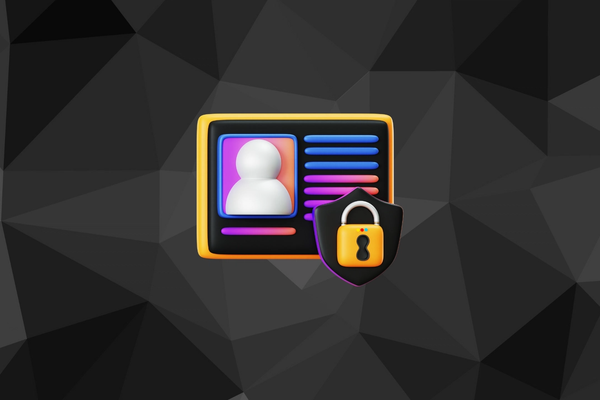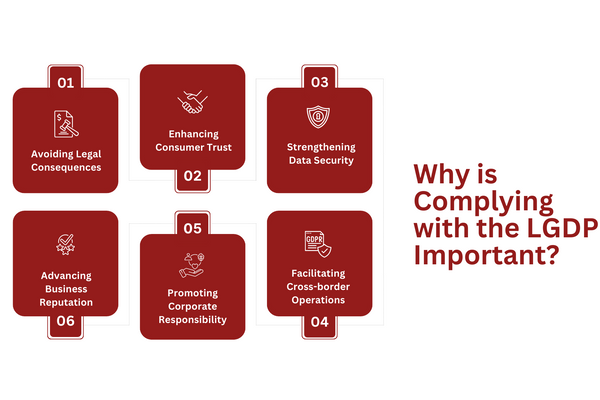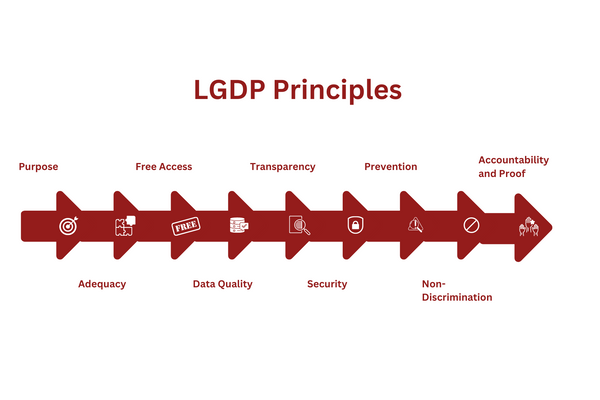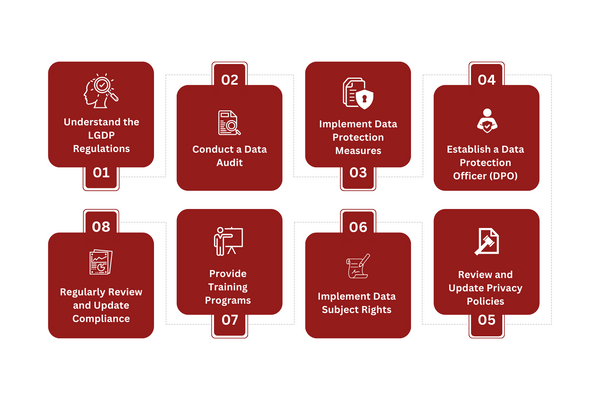
Understanding and ensuring compliance with data protection regulations, like the LGDP, is vital in today’s digital landscape.
Not only is it legally required, but it also instills trust among consumers. The Lei Geral de Proteção de Dados, or LGDP, is a critical regulation that businesses working with Brazilians must pay attention to.
This article will explain what LGDP compliance is, why it’s so significant, and the steps your business needs to take to comply with its provisions.
We’ll also explore how to leverage corporate compliance solutions to ensure LGDP compliance and avoid any potential penalties. Stay with us as we unpack this complex yet indispensable aspect of data protection.
Key Takeaways
Complying with the LGDP (Lei Geral de Proteção de Dados) is crucial for businesses handling the personal data of Brazilians, as it helps avoid legal consequences, enhances consumer trust, strengthens data security, facilitates cross-border operations, promotes corporate responsibility, and advances business reputation.
LGDP compliance requires understanding and implementing the key principles of purpose, adequacy, free access, data quality, transparency, security, prevention, non-discrimination, accountability, and proof.
To comply with the LGDP, businesses should understand the regulations, conduct a data audit, implement data protection measures, provide training and awareness programs, regularly review and update compliance practices, and more.
What is the LGDP?
what-is-the-lgdp.png

The Lei Geral de Proteção de Dados (LGDP) is Brazil’s answer to the increasing need for personal data protection in this digital era. Similar to the General Data Protection Regulation (GDPR) in the European Union, LGDP is a comprehensive data protection law that governs how businesses collect, process, store, and use personal data.
Enacted in 2020, the LGDP applies to any business, irrespective of its location, that processes the personal data of individuals who are in Brazil.
It’s necessary whenever a business deals with data processing activities that involve Brazilian data subjects. Whether the data processing happens within Brazilian territory or not is irrelevant.
The key aspect is that the data subject resides in Brazil. The LGDP dictates stringent regulations for both general and sensitive personal data. General personal data includes any information that could identify an individual, like name, address, and email.
Sensitive personal data refers to racial or ethnic origin, religious belief, political opinion, health, or sexual life data.
LGDP’s main objective is to protect the rights of individual data subjects by promoting transparency and accountability in how their data is managed by businesses.
Why is Complying with the LGDP Important?
why-is-complying-with-the-lgdp-important.png

Compliance with LGDP holds immense significance for businesses handling the personal data of individuals residing in Brazil. The importance of LGDP compliance extends beyond mere legal adherence; it has substantial implications for the overall business strategy, reputation, and consumer trust.
Avoiding Legal Consequences
Non-compliance with LGDP can result in serious legal consequences. These range from simple warnings to hefty fines, the blocking or deletion of the personal data in question, and even suspension of the business’s operation.
Compliance ensures that businesses can steer clear of such punitive actions. Moreover, ensuring compliance helps businesses maintain a healthy legal stature.
Businesses that remain compliant with the LGDP demonstrate to regulatory authorities their commitment to lawfulness, which can be beneficial in any future legal disputes involving data handling.
Enhancing Consumer Trust
The way a business manages personal data can significantly impact its relationship with consumers. Businesses that adhere to LGDP regulations transparently signal to consumers that they respect and protect their data.
This not only builds a foundation of trust but also enhances the overall consumer experience. Consumers are more likely to engage with businesses they can trust with their data, ultimately leading to higher consumer retention and loyalty.
Strengthening Data Security
Compliance with LGDP requires businesses to implement stringent data protection measures. This includes securing personal data through encryption, anonymization, and pseudonymization, ensuring the regular backup of data, and preventing data breaches.
These practices bolster data security, reducing the risk of privacy data breaches and cyber-attacks. This further reinforces trust among consumers and establishes a reputation for safety within the business’s industry.
Facilitating Cross-border Operations
For businesses looking to expand internationally, especially in Brazil, LGDP compliance is crucial. The LGDP provides a compliance framework that aligns with other international data protection laws, such as the GDPR.
Understanding and implementing the GDPR principles alongside LGDP requirements can ensure smoother cross-border operations and reduce the risks associated with handling personal data across different jurisdictions.
By achieving LGDP compliance, businesses are better positioned to comply with other global data protection laws. This ensures smoother cross-border operations and reduces the risks associated with handling personal data across different jurisdictions.
Promoting Corporate Responsibility
LGDP compliance is not just an obligation, it’s an opportunity for businesses to demonstrate their commitment to corporate compliance and responsibility. A business that respects and prioritizes consumer privacy underpins its ethical standpoint and responsible business practices.
This commitment extends beyond consumers. It also affects how investors, partners, and stakeholders perceive the business. A business with strong compliance practices is seen as less risky, potentially attracting more investment and fostering better relationships with stakeholders.
Advancing Business Reputation
Compliance with LGDP can play a significant role in enhancing the reputation of a business. In a world where data breaches and privacy scandals can quickly tarnish a business’s image, taking data protection seriously is a valuable PR strategy.
Adherence to the LGDP shows that the business is dedicated to protecting its consumers’ rights, which can enhance its image and market standing.
In the long run, this commitment to data protection could give a business a competitive edge, driving greater brand loyalty and attracting new consumers who value privacy and data security.
When did the LGDP Take Effect?
The Lei Geral de Proteção de Dados (LGDP) became effective on September 18, 2020. The law was originally passed in August 2018, but its enforcement was postponed until 2020 to give businesses adequate time to adapt their operations and comply with the new requirements.
The two-year grace period also allowed the Brazilian government to establish the National Data Protection Authority (ANPD), the administrative body responsible for overseeing and enforcing the LGDP. The ANPD plays a pivotal role in the application of the LGDP, providing necessary guidance for businesses to comply with the law.
Since the law took effect, businesses that process the personal data of individuals residing in Brazil, irrespective of where the data processing occurs, are obligated to comply with LGDP.
In the years since its enactment, LGDP has reshaped how businesses approach personal data, driving them to adopt a more transparent, consumer-focused approach.
The introduction of LGDP II, the next phase of this regulation, is expected to provide more specific guidelines on how businesses should comply with data protection rules. As such, understanding and implementing LGDP principles has never been more critical for businesses operating in or interacting with the Brazilian market.
What Type of Businesses Must Follow the LGDP?
The LGDP applies broadly to virtually any type of business that processes the personal data of individuals located in Brazil. The regulation’s reach is not limited by the size of the business or the industry it operates in, nor is it confined to businesses physically located in Brazil.
The crucial criteria for LGDP applicability are centered around the nature of data processing activities. Below are the types of businesses that must adhere to the LGDP:
Businesses established in Brazil: Any business headquartered in Brazil, irrespective of where the actual data processing takes place, falls under the LGDP jurisdiction.
Businesses not established in Brazil but process data in Brazil: If a business collects, uses, or processes the personal data of individuals located in Brazil, even if the business is not physically located in Brazil, it must comply with the LGDP.
Businesses involved in data processing related to the offering or supply of goods or services in Brazil: Even if a business is not located in Brazil, if it offers goods or services to individuals in Brazil, it must comply with the LGDP.
From startups to multinational businesses, the LGDP mandates that all businesses processing Brazilian data subjects’ personal data adopt data protection measures in line with its provisions.
LGDP Principles
lgdp-principles.png

The Lei Geral de Proteção de Dados (LGDP) is underpinned by a set of key principles that guide how personal data should be handled by businesses. These principles establish a fundamental framework for data protection and set the tone for the regulation’s specific provisions.
While the wording may differ across various sources, the essence of these principles remains consistent, forming the core values of LGDP. Let’s delve into these principles!
Purpose
The purpose principle mandates that personal data should only be collected and processed for legitimate, specific, and explicit purposes informed to the data subject. This principle promotes transparency and prevents businesses from collecting data without a clear, valid reason.
Adequacy
According to the adequacy principle, the personal data collected must be relevant, proportionate, and not excessive in relation to the purposes for which they are processed. This principle ensures that businesses do not collect more data than necessary, protecting individuals from unnecessary exposure.
Free Access
The LGDP insists on the free access principle, which allows individuals to consult their data easily, free of charge, and at any time. This principle strengthens the rights of individuals, giving them control over their personal data.
Data Quality
This principle ensures that businesses keep the personal data they collect accurate, clear, and up-to-date, with respect to the need and for the purpose of the processing. It helps prevent issues arising from incorrect or outdated data.
Transparency
The transparency principle requires businesses to provide clear, accurate, and easy-to-understand information about data processing activities. This increases the awareness of data subjects and helps them make informed decisions about their personal data.
Security
The security principle underscores the importance of businesses implementing appropriate technical and administrative measures to protect personal data from unauthorized access, destruction, loss, or any form of improper or illicit processing.
Prevention
As per the prevention principle, businesses must adopt measures to prevent damages that may result from the processing of personal data. This anticipatory approach can significantly reduce the risk of privacy data breaches.
Non-Discrimination
The non-discrimination principle prohibits businesses from using data for unlawful or abusive discriminatory purposes. It upholds the fair and equal treatment of all individuals, irrespective of their personal data.
Accountability and Proof
The last principle holds businesses accountable for the data they process. They must demonstrate and prove their compliance with the LGDP principles and norms, implementing effective compliance solutions that can stand up to scrutiny.
How to Comply with LGDP
how-to-comply-with-lgdp.png

To align with the Lei Geral de Proteção de Dados (LGDP), businesses must adopt a series of measures aimed at ensuring the protection of personal data. Compliance with the LGDP is not a one-time task but a continuous process that requires consistent vigilance and adaptation.
Understand the LGDP Regulations
The first step to compliance is understanding the LGDP’s provisions, principles, and requirements. This involves studying the regulation in detail, noting down the key terms and principles, and understanding how they apply to your business.
You may need to consult legal experts or outsource compliance services to get a clear understanding of the LGDP and its implications.
Conduct a Data Audit
Next, businesses should conduct a thorough audit of the personal data they collect, process, and store. Identify what kind of data you have, where it comes from, how it’s used, where it’s stored, and who has access to it.
This audit will give you a comprehensive overview of your data landscape, helping you identify potential areas of non-compliance.
Implement Data Protection Measures
Once you understand your data landscape, implement necessary data protection measures per the LGDP requirements. This includes data encryption, pseudonymization, data backup, and setting up robust data breach detection and response systems. Regularly test and update these measures to ensure their effectiveness.
Establish a Data Protection Officer (DPO)
The LGDP mandates certain businesses to designate a Data Protection Officer (DPO). The DPO, equipped with robust data compliance solutions, will act as a liaison between your business, the data subjects, and the National Data Protection Authority (ANPD). They will oversee the data protection strategy and ensure ongoing compliance with the LGDP.
Review and Update Privacy Policies
Your privacy policy should be updated to reflect the requirements of the LGDP. It should be clear, concise, and transparent about how you collect, use, and protect personal data. Make sure it includes details about data subject rights and how they can exercise them.
Implement Data Subject Rights
LGDP provides data subjects with specific rights, like the right to access, rectify, and delete their data. Implement mechanisms to facilitate these rights and make sure your employees know how to handle such requests.
Provide Training and Awareness Programs
Ensuring LGDP compliance is not just about having the right policies and systems in place; it’s also about making sure your employees understand the importance of data protection and their role in it. Provide regular training and awareness programs to keep your team updated on the LGDP requirements and your business’s data protection practices.
Regularly Review and Update Compliance Practices
Lastly, regular reviews and updates to your compliance practices are crucial. The digital landscape is dynamic, and new data protection challenges can arise at any time. By regularly reviewing your practices, you can quickly identify and address any gaps, ensuring your ongoing compliance with the LGDP.
Closing
As businesses navigate the digital era, LGDP compliance is an essential task, reflecting a business’s dedication to consumer privacy rights. Though this journey may seem daunting, understanding the law and strategic planning can simplify the process.
This is where Captain Compliance can be helpful. We provide tailored compliance services to help you navigate the LGDP’s complexities, offering practical solutions from initial data audits to continuous compliance reviews.
With us, you can focus on your core business while we handle your data protection needs. Our assistance ensures not just compliance with the LGDP but also fosters a culture of data protection that enhances consumer trust. So, get in touch with us today!
FAQs
What are the penalties for non-compliance with the LGDP?
Non-compliance with the LGDP can result in severe penalties, including fines of up to 2% of a business’s revenue in Brazil for the previous fiscal year, up to a total of 50 million Brazilian reais per incident. Businesses may also face additional sanctions like public exposure of the violation and the suspension or prohibition of personal data processing.
To understand more about the LGDP penalties, stay in touch with us!
Do small businesses need to comply with the LGDP?
Yes, LGDP applies to all businesses, regardless of their size, that process the personal data of individuals in Brazil. It’s important to understand that the LGDP’s requirements are not less stringent for small businesses.
For more details on how small businesses can comply with the LGDP, contact us today!
Is the LGDP similar to the GDPR?
While both the LGDP and GDPR aim to protect personal data and uphold consumer rights, they differ in certain aspects, such as geographical scope, legal bases for processing data, and some specific rights of data subjects.
To get a comparative understanding of other regulations like the GDPR, click here!
How often should businesses review their compliance with the LGDP?
LGDP compliance should be an ongoing process. Considering the dynamic nature of the digital landscape, businesses should regularly review their data protection practices, ideally every six months or whenever significant changes occur in their data processing activities.
For advice on conducting a compliance review, check out our service page.